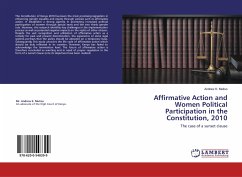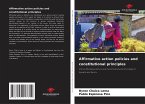The Constitution of Kenya 2010 has been the most promising legislation in enhancing gender equality and equity through policies such as affirmative action. It establishes a strong agenda in promoting increased political participation of women through special seats and the two thirds gender rule. However, this research identifies key challenges in the implementation process as well as potential negative impacts on the rights of other citizens.Despite the vast recognition and utilization of affirmative action as a remedy for past and present discrimination, the experience of some legal systems portrays that the policy should be adopted on a temporary basis. Subsequently, this study uncovers the life cycle of affirmative action which should be duly reflected in its creation. However, Kenya has failed to acknowledge the termination level. The future of affirmative action is therefore concluded as wanting and in need of proper regulation in the form of a sunset clause once its objectives have been realized.








